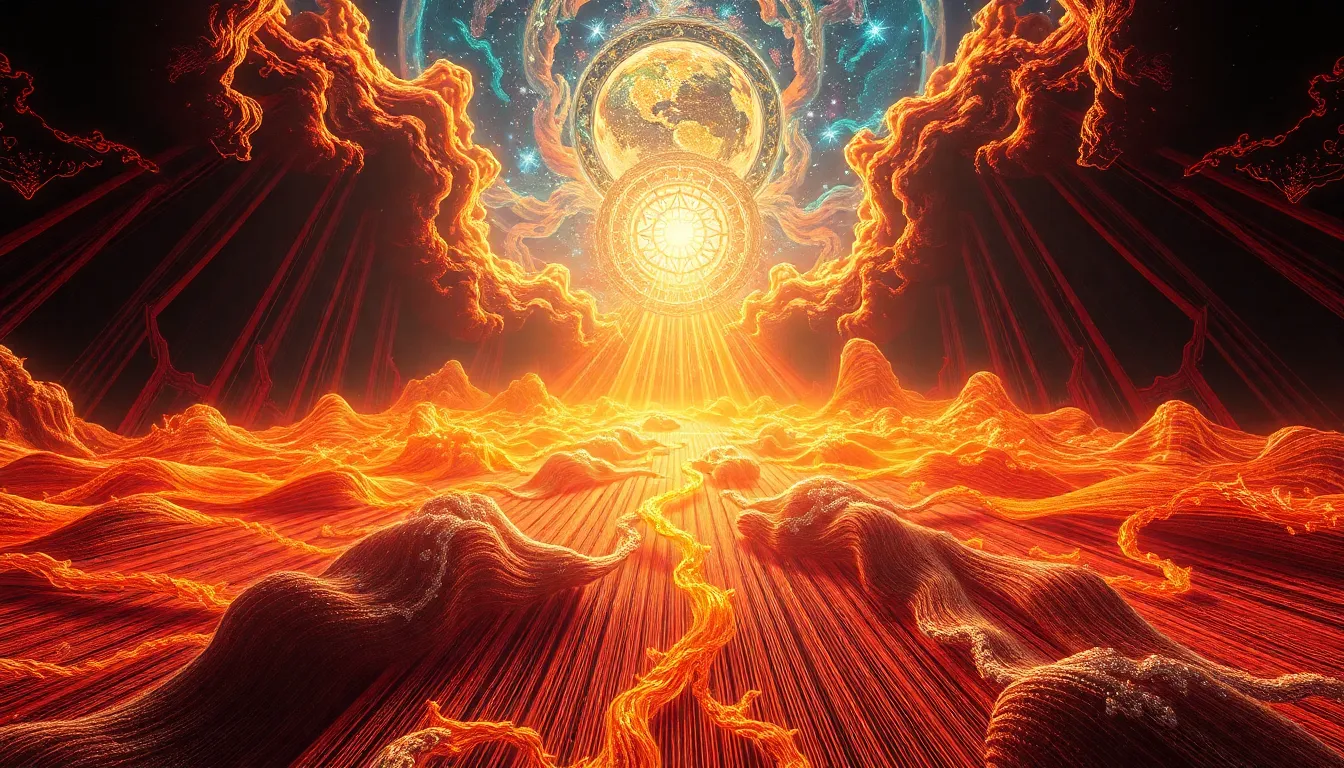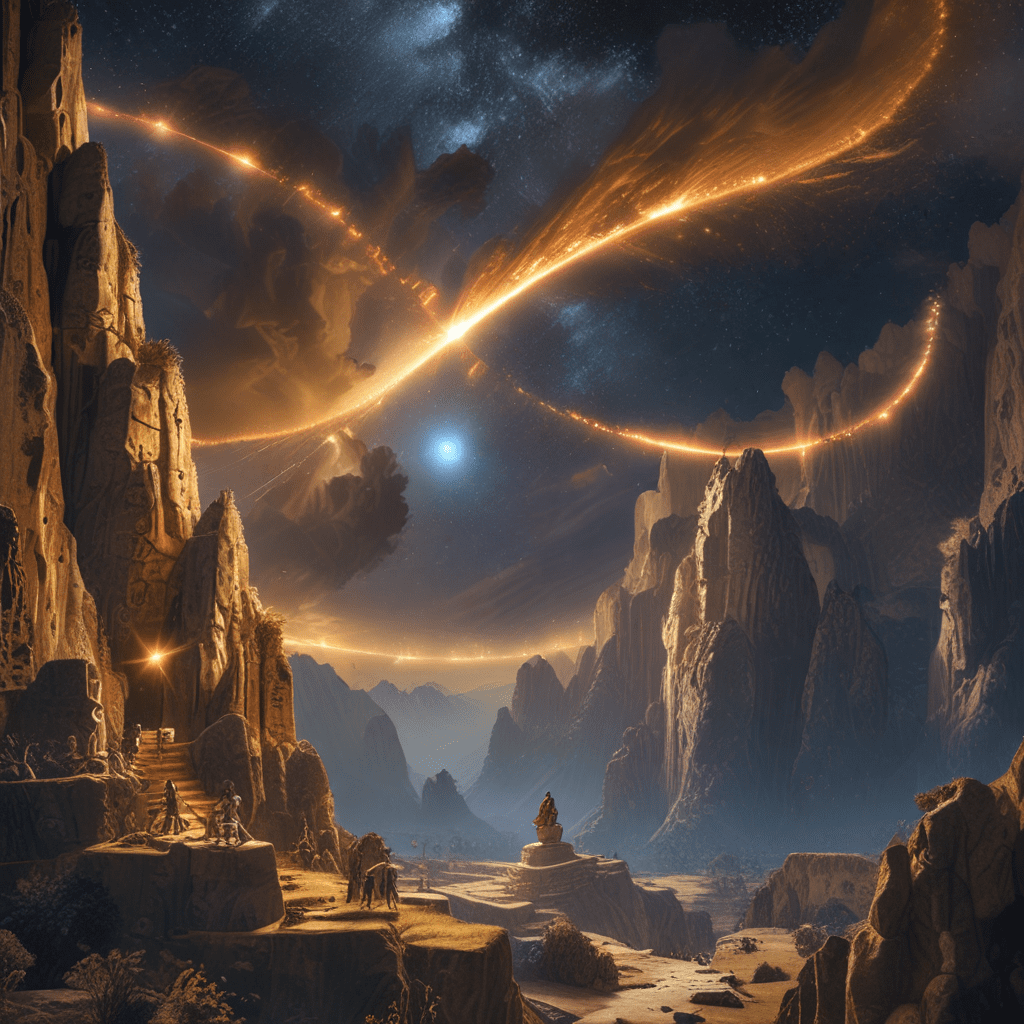The Fabric of Reality: Creation Myths That Weave Our Existence
I. Introduction to Creation Myths
Creation myths are fundamental narratives that explain how the world and humanity came into being. They serve as a lens through which cultures interpret their existence, values, and the mysteries of life. These stories are not mere tales; they are woven into the fabric of societies, providing meaning and context to the human experience.
The significance of creation myths transcends mere storytelling; they encapsulate the beliefs, traditions, and worldviews of different cultures. From the Dreamtime of Australian Aboriginals to the Enuma Elish of Mesopotamia, these myths shape our understanding of existence and our place in the universe.
This article will explore the purpose of creation myths, delve into specific indigenous and ancient narratives, compare Eastern philosophies, examine classical myths, and analyze their relevance in contemporary contexts. We will also reflect on the psychological and cultural impacts of these enduring stories.
II. The Purpose of Creation Myths
Creation myths serve several vital purposes across cultures:
- Understanding human existence and purpose: They provide explanations for why humans are here and what role they play in the cosmos.
- Explaining natural phenomena and the universe: Many myths describe the origins of the earth, the sky, and natural events, helping people make sense of their environment.
- Offering moral and ethical guidelines: Creation myths often include lessons and morals that guide behavior and societal norms.
III. Indigenous Creation Stories
Indigenous cultures around the world possess rich creation narratives that are deeply connected to their land, spirituality, and way of life.
A. The Dreamtime of Australian Aboriginal cultures
In Australian Aboriginal cultures, the Dreamtime is a foundational concept that describes a time when ancestral spirits created the land, animals, and people. These stories are not just historical accounts but living narratives that guide social practices and relationships with the environment.
B. Native American creation narratives
Native American cultures feature a variety of creation stories, each unique yet sharing common themes of emergence and transformation.
1. The Earth Diver myth
In the Earth Diver myth, a cultural hero dives into the primordial waters to bring up mud, which becomes the earth. This story emphasizes the interconnectedness of all living beings and the importance of the earth.
2. The emergence stories
Emergence stories often depict beings coming from another world, gradually ascending to the surface of the earth. These narratives highlight themes of growth, change, and the journey of life.
C. The significance of land and nature in these myths
Indigenous creation stories often reflect a profound respect for the land and nature, illustrating how these elements are integral to cultural identity and spiritual beliefs.
IV. Ancient Mesopotamian and Near Eastern Myths
Ancient Mesopotamia is home to some of the earliest recorded creation myths, which have influenced many other cultures.
A. The Enuma Elish and the Babylonian creation
The Enuma Elish, a Babylonian creation epic, describes the birth of the gods, the emergence of the world from chaos, and the establishment of order. Marduk, the chief god, defeats the primordial sea goddess Tiamat, symbolizing the triumph of order over chaos.
B. The role of gods and chaos in shaping the world
In these myths, gods often embody natural forces and human characteristics, illustrating the belief that the divine is deeply intertwined with the world. Chaos is a recurring theme, representing the unknown that must be tamed for creation to occur.
C. Comparisons with the Genesis creation story in the Hebrew Bible
Comparing the Enuma Elish with the Genesis creation story reveals both similarities and differences. While both narratives describe the creation of the world and humanity, Genesis emphasizes a singular, benevolent creator, contrasting with the polytheistic and chaotic themes of the Enuma Elish.
V. Eastern Philosophies and Creation
Eastern philosophies offer diverse perspectives on creation that differ significantly from Western narratives.
A. Hindu cosmology and the concept of Brahman
In Hinduism, creation is often viewed as a cyclical process governed by Brahman, the ultimate reality. The universe undergoes cycles of creation, preservation, and destruction, reflecting the interconnectedness of all existence.
B. The Taoist perspective on creation and the Tao
Taoism offers a unique view of creation through the concept of the Tao, the fundamental principle that underlies and unites all things. Creation arises from the interplay of Yin and Yang, emphasizing balance and harmony in the universe.
C. Buddhist views on existence and the cycle of rebirth
Buddhism focuses on the cycle of birth, death, and rebirth (samsara), emphasizing the impermanence of all things and the quest for enlightenment as a means to escape this cycle.
VI. Mythical Narratives from the Classical World
The classical world also produced rich creation myths that have shaped Western thought.
A. Greek creation myths: Chaos, Gaia, and the Titans
In Greek mythology, creation begins with Chaos, followed by the emergence of Gaia (Earth) and other primordial deities. The Titans, offspring of Gaia, play a crucial role in the evolution of the cosmos and the eventual rise of the Olympian gods.
B. Roman adaptations and the influence of Greek mythology
The Romans adapted Greek myths, blending them into their own culture and influencing the development of Western literature and art. Figures like Virgil and Ovid popularized these stories, ensuring their survival through the ages.
C. The impact of these myths on Western thought
Greek and Roman creation myths have profoundly influenced Western philosophy, literature, and art, providing archetypes and themes that resonate through centuries of creative expression.
VII. Creation Myths in Modern Contexts
In the modern era, creation myths continue to evolve and adapt to contemporary values and beliefs.
A. The resurgence of myth in contemporary spirituality
Many people today are revisiting ancient myths as a source of spiritual guidance and identity, finding resonance in their themes of unity and interconnectedness.
B. Science fiction and new creation narratives
Science fiction often explores new creation narratives that challenge traditional beliefs, such as the creation of artificial life or alternate realities, prompting discussions about humanity’s role in the universe.
C. How modern creation stories reflect current societal values
Modern creation stories often reflect contemporary issues such as environmentalism, technology, and social justice, highlighting the ongoing relevance of these narratives in addressing existential questions.
VIII. Comparative Analysis of Creation Myths
Despite cultural differences, many creation myths share common themes and motifs:
A. Common themes and motifs across cultures
- Chaos and order
- The role of a creator or divine beings
- The emergence of humanity and nature
B. Divergences in interpretation and symbolism
While many myths share themes, their interpretations and symbols can vary significantly, reflecting the unique values and beliefs of each culture.
C. The universality of creation myths in human experience
Creation myths serve as a universal aspect of human experience, addressing fundamental questions about existence, purpose, and the nature of reality.
IX. The Psychological and Cultural Impact of Creation Myths
Creation myths have profound effects on both individual and collective psychology.
A. Myths as a tool for identity and community bonding
These




